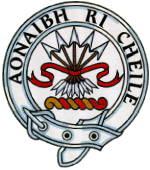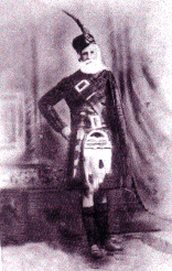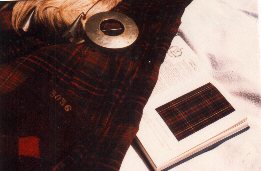THE CAMERONS OF SCOTLAND

The Camerons are descended from the ancient Dalriadic kings of the West Coast. An old Irish manuscript lists their ancestry from Ferchar Fada of the tribe of Lorn, king of Dalraida in 697. The Gaelic name was Camshron. The name is from the Gaelic Cam-shorn, meaning hook nose. It is said that a hooked nose was a characteristic of the old Clan Cameron families. Their principal territory was Locheil and Northern Argyll. The Cameron chiefs were distinguished for their warlike tendencies.They were known as fierce fighters: “For centuries the Camerons held by the sword the lands that had once been Clan Chattan’s heritage in Lochaber. Their ferocious war cry was a promise to feed their enemies’ flesh to dogs: “Sons of the hounds come here and get flesh”. Their territory was bounded to the south by the MacLeans, to the west by the MacDonalds. Most of Cameron country is over one thousand feet in altitude. The highest mountain in Britain, Ben Nevis, is included in this area. The area contains eagles, wild cats, foxes, otters and red deer. The last wolf in Scotland is said to have been killed in 1680 by Ewan Cameron of Lochiel.
The
earliest historically recorded Cameron laird was Donald Dubh (or
Black
Donald) mentioned in the fifteenth century. He was a formidable
Lochaber
warrier, and is considered to be the eleventh chief of Clan
Cameron. One
of the best known Cameron chiefs was Sir Ewen Cameron, in the
late 1600s.
He was the last chief to hold out against Cromwell, and bit
through a Cromwellian
officer’s windpipe while locked in mortal combat near
Inverlochy. Despite
his ferocity, Ewan was said to be “the very model of a Highland
gentleman
of those times.” He trained his men to be tough and disciplined,
and to
say that a bed of snow was like a “thrice-driven bed of down”.He
saw one
of his nephews had rolled together a large snowball as a pillow
for his
head. Ewan kicked the heap from under his head, saying “What!
Are you become
a luxurious that you cannot sleep without a pillow?”
The
Camerons fought on the side of Bonnie Prince Charlie in the
battle of Culloden:
“Donald Cameron of Lochiel was a man on whom the exiled Stewarts
rested
stronger hopes than on any other chieftain in the Highlands.
Individually,
he headed a powerful and warlike clan, who so loved him that
they would
have gone at his lightest word into the very jaws of death. All
the Highlands,
from end to end, looked up confidingly to Locheil; and though he
did his
utmost to prevent the rash insurrection of 1745, his final
accession to
the cause of Charles did more to determine the rising of the
Gael generally,
than any other influence called into force on the occasion.” The
meeting
of Prince Charles and Cameron is described: “When Lochiel and
the Chevalier
met, the former used all the arguments that a man of sound sense
and good
feeling could do, to prevent the futility and hopelessness, for
the time,
of the proposed undertaking. He spoke in vain; and at last
Charles tauntingly
exclaimed, “In a few days I will raise the royal standard.
Locheil, whom
my father has often spoken of as our warmest friend, may stay at
home,
and learn from the newspapers the fate of his prince!” “No!”
cried Lochiel,
in tears, “I will share the fate of my prince, come weal, come
wo! And
so shall every man over whom nature or fortune has given me
power!” On
these words, we may almost say, the civil war of 1745 hung.” (Clan
Cameron)
Lochiel rallied Clan Cameron, and prepared for battle with
700 Camerons
following him. The Camerons stood in the front lines at the
battle of Culloden.
Their fight has been described by eye witnesses: “With their
bonnets pulled
tightly over their brows, their bodies half-bent, their shields
raised
so as to cover the head and vital parts, and their broadswords
quivering
in their nervous gripe, they sprung forward upon their foes like
crouching
tigers, their eyes gleaming with an expression fierce and
terrific to the
last degree. In this charge the front rank of the Camerons fell
almost
to a man.” (Clan Cameron)
The
clan motto is “For king and country”.
The
clan war cry is “Sons of the hounds come here and get
flesh”.
Alexander Cameron, our ancestor was born in 1797 in Strontian, Argyllshire, in the highlands of Scotland. His father, John must have been born in the years following Culloden. It is not known how they came to live in Strontian or Kilmelford. The kilt worn by John Alexander Cameron is the tartan of Cameron of Erracht.

John Cameron in his kilt

John Cameron's kilt
To visit the Clan Cameron webpage, click here.
![]()
If you have any additional information about this family,
please
contact me at alice@boydhouse.com.
![]()